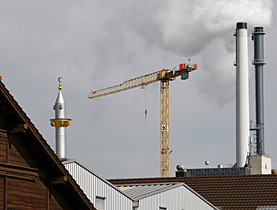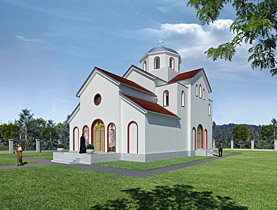One sentence that splits opinion

If voters agree on November 29, one extra sentence will be added to the Swiss constitution: "the construction of minarets is prohibited".
Several planning permission applications in the German-speaking part of the country provided the catalyst for the vote, with local residents collecting signatures against the towers’ construction.
The rightwing Swiss People’s Party and the ultra conservative Federal Democratic Union, fearing a creeping Islamicisation, coordinated the anti-minaret campaign and took it to the national level.
A people’s initiative calling for a ban on minaret construction was handed in to parliament on July 8, 2008 with almost 115,000 signatures. To force a nationwide vote, 100,000 votes have to be collected within 18 months.
“Of course it’s not about the towers,” People’s Party parliamentarian Ulrich Schlüer told swissinfo.ch. “The minaret has no religious meaning. It is a symbol of power, of political Islamicisation becoming established.”
“We are defending ourselves against this Islamicisation, which is contrary to our constitution.
Asked which articles of the constitution he was referring to, Schlüer said: “In Switzerland there are several thousand forced marriages, that is unconstitutional. We are seeing an increasing number of people covered up from head to foot. Ours is a society in which people go about with their faces uncovered and express their opinions.”
For the opponents of the initiative, this line of argument is clearly discriminatory. “Muslims as a whole are being accused of dishonourable and even unlawful conduct, although this is at odds with reality,” stated the Federal Commission against Racism.
Switzerland has other means of preventing the spread of Islamic fundamentalist views aimed at subverting Swiss institutions, says centre-right Christian Democrat parliamentarian Hansheiri Inderkulm.
“In the first place, integration measures are important. These have been strengthened by the new [2006] law on foreigners. In addition, we have the federal law on internal security,” he told swissinfo.ch.
Government opposition
Both the cabinet and parliament are recommending voters turn down the initiative on banning minarets. Parliamentary debates focused on the issue of whether the initiative should even be put before the people, as it possibly contravened international law.
After heated debate, the two chambers came to the conclusion that the initiative could go to a nationwide vote. It did not clearly infringe international law but did restrict the religious freedom anchored in the constitution in an inadmissible way. Furthermore it violated the European Convention on Human Rights and the law against discrimination.
“The initiative is not directed against mosques neither is it directed against people practising their faith together in a meeting room,” countered Schlüer. “So freedom of religion will still be guaranteed.”
In Switzerland everyone has the right, within a public setting, to live their faith visibly, freely and in a community, insists the Council of Religions, a body comprising Christian churches, Jews and Muslims. “This includes the right to build the customary places of worship of that religion.”

More
People’s initiative
Economic importance
The state-recognised Christian churches also stress the importance of integration and tolerance and reject the initiative.
“The Swiss bishops are not naive,” said the president of the Swiss Bishops Conference, Kurt Koch. The bishops were aware that not all Islamic countries respected religious and cultural freedom, but two wrongs did not make a right, Koch said.
For her part, Foreign Minister Micheline Calmy-Rey described the initiative as “dangerous for foreign policy and Switzerland’s relations to other countries”.
In 2008, Swiss exports to the Arab world amounted to SFr8.7 billion ($8.36 billion). “There is a danger of upsetting these countries,” Calmy-Rey said.
Andreas Keiser, swissinfo.ch (Adapted from German by Morven McLean)
The people’s initiative “Against the Construction of Minarets”, if adopted, would involve a change to the federal constitution.
To be adopted therefore, there has to be a double yes vote on Sunday, November 29: both a majority of the electorate and a majority of the cantons have to approve it.
The new law on foreigners was adopted in a popular vote on September 24, 2006.
It limits immigration for citizens outside the European Union and the European Free Trade Association (Efta) to highly skilled labour.
It also aims to encourage integration, in particular by language courses, while cracking down on human trafficking and marriages of convenience.
Foreigners also have to make efforts towards integration, according to the spirit of the law.

In compliance with the JTI standards
More: SWI swissinfo.ch certified by the Journalism Trust Initiative












You can find an overview of ongoing debates with our journalists here . Please join us!
If you want to start a conversation about a topic raised in this article or want to report factual errors, email us at english@swissinfo.ch.